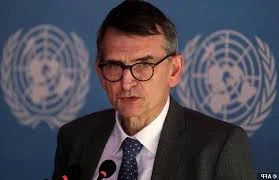The United Nations representative in Sudan launches talks to resolve the political crisis
The United Nations Special Envoy to Sudan, Volker Peretz, is launching talks to resolve the escalating political crisis in the country since the army chief, Lieutenant-General Abdel Fattah al-Burhan, overthrew his civilian partners in the transitional authority more than two months ago.
In a press conference on Monday, Peretz confirmed that everyone, "including political parties, armed movements, civil society, women's associations, resistance committees, and others have been invited to participate in preliminary consultations."
The UN official explained that he and his team will hold “indirect talks with all parties,” stressing that “the United Nations will not come up with any project, draft or vision for a solution, and even we will not come up with a proposal for the content of the main disputed issues, and we will not adopt a project for any side.”
He pointed out that "these are all Sudanese matters for the Sudanese men and women."
Since the October 25 coup, the course of the transitional phase in Sudan, which was agreed upon between the military and civil forces in August 2019, a few months after the overthrow of former President Omar al-Bashir in the same year, following popular protests that lasted 4 months , has been disrupted .
The Sudanese, sometimes tens of thousands, have repeatedly taken to the streets since the coup, demanding the removal of the military from power and purely civilian rule.
The security forces' repression of the protest demonstrations resulted in the killing of 63 people, most of them with live bullets, and the injury of hundreds, according to a new toll announced by the Central Committee of Doctors (independent syndicate), which confirmed the death of a protester on Monday from wounds sustained on Sunday.
And on Saturday, the United Nations announced that it would launch “preliminary consultations” between civilians and the military in Sudan with the aim of resolving the crisis in the country since the military coup.
But the reaction of the main civilian forces in Sudan to the UN initiative has so far appeared tepid.
“Dismissal of the coup regime”
"We have not yet received any details about the initiative," said Jaafar Hassan, a spokesman for the main faction in the Forces of Freedom and Change, which played a pivotal role in the demonstrations against al-Bashir.
"We are ready to participate in the talks, provided that the goal is to resume the democratic transition and put down the coup regime, but we are against this initiative if it aims to legitimize the coup regime," he told AFP.
The Sudanese Professionals Association, which also played a pivotal role in the protests that led to the overthrow of Al-Bashir, announced on Sunday its rejection of the initiative and its “firm adherence to the no’s declared by the forces of the live revolution, which are “no negotiation, no partnership, no legitimacy.”
The assembly considered that "the solution is to overthrow the authority of the Military Council and wrest the full civilian popular authority."
In a statement Saturday, Peretz explained that "the repeated violence against peaceful demonstrators after the coup has only contributed to deepening the mistrust among all political parties in Sudan," noting that so far "all the measures that have been taken have not succeeded in restoring the path of the (democratic) transition."
On October 25, Al-Burhan disrupted the completion of the transfer of power to civilians by arresting Prime Minister Abdullah Hamdok and the majority of civilian leaders and suspending the work of the Sovereignty Council.
Despite Al-Burhan’s pledge to hold general elections in mid-2023, protests continued against the coup and the settlement in which Prime Minister Abdalla Hamdok agreed to return to office on November 21, which the demonstrators considered “treason.”
And last week, Hamdok announced his resignation, stressing that he had tried to find consensus, but failed, and warned that the country was facing a "dangerous turn that might threaten its survival" and that he was seeking to avoid "Sudan's sliding into the abyss."
The UN Security Council will hold an informal closed meeting on Wednesday to discuss the latest developments in Sudan, according to what diplomatic sources announced on Friday.





